Truthdigger of the Week: Former British Ambassador and Whistleblower Craig Murray
Murray, who has been denied entry into the United States to travel to an intelligence-community conference, was removed from the British diplomatic service after he exposed human rights abuses in Uzbekistan.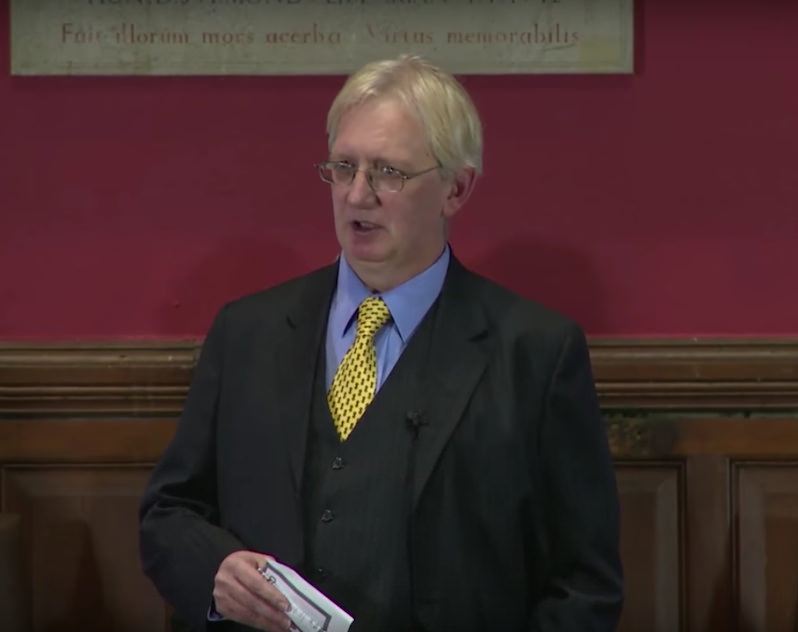
Craig Murray giving a speech in defense of WikiLeaks in 2013. (Screen shot via YouTube)
Every week the Truthdig editorial staff selects a Truthdigger of the Week, a group or person worthy of recognition for speaking truth to power, breaking the story or blowing the whistle. It is not a lifetime achievement award. Rather, we’re looking for newsmakers whose actions in a given week are worth celebrating.
Craig Murray, a former British ambassador to Uzbekistan, has dealt with his fair share of consequences due to his politics, but a recent hitch in his travel plans served to remind the whistleblower and activist that his political history may still be following him.
This week, Murray was denied entry into the United States via the U.S. Visa Waiver Program. The program is intended to enable “most citizens or nationals of participating countries to travel to the United States for tourism or business for stays of 90 days or less without first obtaining a visa.” Murray is set to chair the presentation of this year’s Sam Adams Award for integrity in intelligence, which takes place Sept. 25, to CIA-torture whistleblower John Kiriakou.
Despite visiting the U.S. under this visa waiver program many times in the past, Murray was told his travel was “not authorized” when he applied for entry this time around. In a blog post Monday, Murray wrote:
I have been refused entry clearance to the USA to chair the presentation of the Sam Adams Award to CIA torture whistleblower John Kiriakou and to speak at the World Beyond War conference in Washington DC. Like millions of British passport holders I have frequently visited the USA before and never been refused entry clearance under the visa waiver programme.
I shall apply for a visa via the State Department as suggested but I must be on a list to be refused under the ESTA system, and in any event it is most unlikely to be completed before the conference.
It is worth noting that despite the highly critical things I have published about Putin, about civil liberties in Russia and the annexation of the Crimea, I have never been refused entry to Russia. The only two countries that have ever refused me entry clearance are Uzbekistan and the USA. What does that tell you?
I have no criminal record, no connection to drugs or terrorism, have a return ticket, hotel booking and sufficient funds. I have a passport from a visa waiver country and have visited the USA frequently before during 38 years and never overstayed. The only possible grounds for this refusal of entry clearance are things I have written against neo-liberalism, attacks on civil liberties and neo-conservative foreign policy. People at the conference in Washington will now not be able to hear me speak.
Plainly ideas can be dangerous. So much for the land of the free!
Murray’s political history lends a crucial context to the controversy. In 2004, he was dismissed from his position as the British ambassador to Uzbekistan after undergoing a widely publicized disciplinary investigation for his comments on the country’s human rights failure. In 2002, Nick Cohen of The Guardian stated that one of Murray’s speeches “broke with all the established principles of Foreign Office diplomacy.” The Guardian later covered a second incident in which one of Murray’s speeches sparked controversy:
In October 2002, Murray made a speech to his fellow diplomats and Uzbekistani officials at a human rights conference in Tashkent in which he became the first western official for four years to state publicly that “Uzbekistan is not a functioning democracy”, and to highlight the “prevalence of torture in Uzbekistani prisons” in a system where “brutality is inherent”. Highlighting a case in which two men were boiled to death, he added: “All of us know that this is not an isolated incident.”
As weeks passed, the speech received more negative attention, yet Murray continued to send honest accounts of Uzbekistan’s human rights abuses to his London superiors—dispatches that ultimately went public and may have been the catalyst for his dismissal. “Mr. Murray said officials had been trying to force him out for a year because of his dispatches back to London,” the BBC reported in October 2004. It continued:
In one he claimed MI6 had used information passed on to it by the CIA but originally obtained in Uzbek torture cells—something strongly denied by the Foreign Office.
In the leaked telegram, printed in the Financial Times, he wrote that the use of information gained by torture was “morally, practically and legally wrong.”…
He added: “This sends a very strong signal that since the start of the war on terrorism, anyone who even internally questions what’s happening from a liberal standpoint is going to seriously damage their employment prospects.”
“People come to me very often after being tortured,” he told The Guardian’s Nick Paton Walsh in 2004, shortly before his dismissal. “Normally this includes homosexual and heterosexual rape of close relatives in front of the victim; rape with objects such as broken bottles; asphyxiation; pulling out of fingernails; smashing of limbs with blunt objects; and use of boiling liquids including complete immersion of the body. This is not uncommon. Thousands of people a year suffer from this torture at the hands of the authorities.”
His subsequent removal from his position left more than a dent in his resume. “I had a period under psychiatric care as an in-patient for depression,” he told Walsh. “I’ve gone through the break-up of my marriage. In November, I suffered a pulmonary embolism and very nearly died. … An aura of controversy is not one that is useful to the diplomatic corps.”
In the years since his turbulent expulsion from the British diplomatic service, Murray published several books and immersed himself in political activism. In 2006, for example, he again made headlines for publishing classified memos from his time in Britain’s government on his website. “U.S. plays down human rights situation in Uzbekistan,” he wrote in one memo. “A dangerous policy: increasing repression combined with poverty will promote Islamic terrorism.”
Now, he is again in the spotlight, accusing the U.S. government of denying him entry due to his politics. After Murray broke this news on his own blog, others in the intelligence community began to rally around him.
“Craig Murray is a legendary figure among national security whistleblowers,” John Kiriakou told Truthdig. “He blew the whistle on the government of Uzbekistan’s torture program, and he paid for it with his career. He has since devoted himself to the causes of human rights and civil liberties. That he is being denied entry into the United States tells me that Secretary of State John Kerry is afraid of ideas. He is afraid of those who stand up for what is right.”
Members of the Sam Adams Associates for Integrity in Intelligence issued a statement in which they called Murray’s visa denial “shocking and appalling,” before questioning “which agency’s long arms have reached out to disrupt our ceremony and to try to silence Craig.” It continues:
Whatever they intend, it will be bound to backfire, since it only makes the US government look like some sort of monolithic repressive apparatus out to mimic the world’s worst despotic regimes. Ambassador Murray notes in his blog that Uzbekistan — whose government apparatchiks are notorious for torturing its citizens — is the only other country to have barred his entry. Even Russia – which Ambassador Murray criticizes freely – allows him to travel there trouble-free. What are the implications for US democratic values?
Meanwhile, the organization behind the No War 2016 conference, where Murray is scheduled to speak, has created a petition in support of his admittance to the U.S. “This attempt to prevent a truth-teller from speaking in support of nonviolence is absolutely shameful,” said David Swanson, director of World Beyond War, which is sponsoring the conference. “This is not a policy created to represent any view of the U.S. public, and we are not going to stand for it.”
Peter Van Buren, a former United States foreign service employee turned whistleblower, recently explained why somebody like Murray would be denied entry through this program. “What we’ve got is likely a potential 3B violation or potential violation, which means terrorism,” he told The Real News Network. “You don’t have to be a terrorist to fall under this category. You can just be placed on one of these watch lists by one of the dozens of American intelligence agencies and organizations that are allowed to nominate names—and they do love their Orwellian vocabulary—to the list.”
Could this be the case? Murray has since shared more detail on his denial to the U.S. via Twitter:
Received unsoliicited very polite email from US Embassy in London saying entry clearance refusal was due to visiting Iraq offering to help.
— Craig Murray (@CraigMurrayOrg) September 8, 2016
Second email arrives from US Embassy – in the evening – saying they cannot assist with entry clearance after all. Still denied entry.
— Craig Murray (@CraigMurrayOrg) September 9, 2016
Despite the disruption to his travel plans, Murray has continued to share his political opinions in the days since revealing the visa waiver refusal. He has provided critical analysis of the current political transition in Uzbekistan. “ I am happy to say I do not believe the corrupt system in Uzbekistan will last much longer,” he concludes. Another recent blog post criticizes the “underreporting” of U.K. Prime Minister Theresa May’s quoting of a “sexist, racist and anti-disabled” Twitter account.
It is unclear whether Murray will be able to secure the necessary visa waiver in time for his scheduled appearances in the U.S. later this month. Despite this, it’s clear that he will continue to shed light on underreported and politically subversive topics, as he has bravely done for decades. For this reason, Craig Murray is our Truthdigger of the Week.
Independent journalism is under threat and overshadowed by heavily funded mainstream media.
You can help level the playing field. Become a member.
Your tax-deductible contribution keeps us digging beneath the headlines to give you thought-provoking, investigative reporting and analysis that unearths what's really happening- without compromise.
Give today to support our courageous, independent journalists.
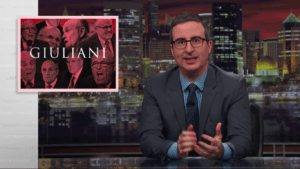
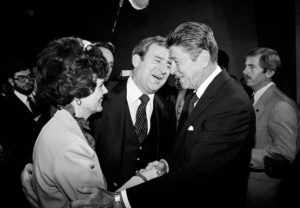

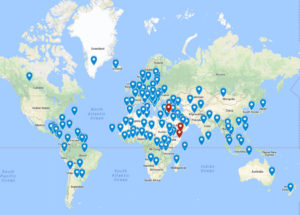
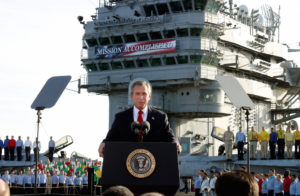

You need to be a supporter to comment.
There are currently no responses to this article.
Be the first to respond.